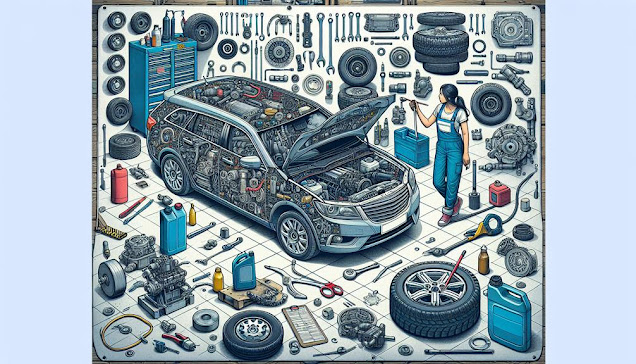How to Become a Car Mechanic: Training and Career Pathway
The automotive industry is constantly evolving, with Asian car manufacturers such as Toyota, Honda, Nissan, and Hyundai recognized for their reliability and innovation. Given the growing number of these vehicles on the road, the demand for skilled car mechanics who specialize in Asian models is at an all-time high.
If you’re passionate about working on Toyota hybrid systems, Honda VTEC engines, or Nissan’s CVT transmissions, a career as a car mechanic offers both stability and long-term growth opportunities. This guide outlines the education, training, and certifications necessary to establish a successful career in automotive repair.
Step 1: Educational Requirements for a Car Mechanic
While becoming a car mechanic does not require a four-year college degree, acquiring a strong foundation in automotive technology is essential.
High School Diploma or GED
Most employers prefer candidates with a high school diploma or GED. Taking automotive technology, mathematics, physics, and computer science courses provides a strong base of knowledge. Many high schools offer automotive training programs, allowing students to gain practical experience before advancing to formal training.
Vocational and Technical Training Programs
Many aspiring car mechanics enroll in vocational schools or community college programs that focus on automotive technology. These programs typically last six months to two years and cover key areas, such as:
✅ Engine diagnostics and repair (specializing in Toyota’s 2JZ and Honda’s K-series engines)
✅ Brake and suspension systems (troubleshooting issues in Nissan Altima and Hyundai Sonata)
✅ Electrical and electronic systems (diagnosing hybrid models like Lexus RX and Honda Insight)
✅ Computerized vehicle diagnostics (using OBD-II scanners for Mitsubishi and Subaru repairs)
Top institutions like the Universal Technical Institute (UTI), Lincoln Tech, and local community colleges provide specialized training in Asian automotive brands, giving students a competitive edge in the job market.
Step 2: Hands-On Training and Apprenticeships for a Car Mechanic
While formal education is valuable, gaining practical experience is crucial. Many aspiring car mechanics begin as apprentices or trainees at independent repair shops or brand-specific dealerships.
What You’ll Learn During an Apprenticeship:
🔧 Work directly with experienced automotive professionals
🚗 Diagnose and repair common issues in Toyota, Honda, and Nissan vehicles
⚙️ Gain hands-on experience with specialized tools and diagnostic equipment
Manufacturer-Sponsored Training Programs
Several automakers provide factory training programs that focus on their brand-specific technology. These programs offer real-world experience and often lead to full-time employment at dealerships:
🔹 Toyota T-TEN Program – Provides certified technician training for Toyota vehicles
🔹 Honda PACT Program – Specializes in Honda and Acura vehicle diagnostics and repair
🔹 Nissan Technician Training Academy (NTTA) – Prepares mechanics for Nissan’s advanced technology
Apprenticeships and factory training programs enhance job prospects and increase earning potential by providing certified brand expertise.
Step 3: Earning Certifications as a Car Mechanic
While certifications are not always mandatory, obtaining them can significantly boost career opportunities and increase salary potential. The Automotive Service Excellence (ASE) certification is the most recognized credential in the industry.
ASE Certification and Manufacturer-Specific Training
The ASE certification, provided by the National Institute for Automotive Service Excellence, covers the following specialties:
✔ Engine diagnostics and repair (troubleshooting issues in Toyota Corolla and Honda Accord engines)
✔ Brake and suspension systems (repairing ABS malfunctions in Mazda CX-5)
✔ Electrical and hybrid technology (servicing Lexus hybrid models and Nissan Leaf EVs)
✔ Transmission repairs (handling Subaru CVT transmission diagnostics and rebuilds)
Additionally, many Asian automakers offer brand-specific certifications to mechanics looking to specialize in a particular manufacturer:
🔹 Toyota Certified Technician Program
🔹 Honda Professional Automotive Career Training (PACT)
🔹 Nissan Technician Training Academy (NTTA)
🔹 Hyundai Automotive Technology Training Program
Earning these certifications makes a car mechanic more valuable to dealerships and independent repair shops that specialize in Asian vehicles.
Step 4: Career Opportunities for a Car Mechanic
Once you’ve completed your education, training, and certifications, various career paths become available:
🚗 Independent Repair Shops – Work on multiple Asian vehicle models and provide general maintenance services.
🏬 Dealership Service Centers – Become a brand-certified specialist for Toyota, Honda, or Hyundai.
🚛 Fleet Maintenance – Maintain and repair rideshare and delivery vehicles, such as Toyota Prius and Honda CR-V models.
⚡ Hybrid and Electric Vehicle (EV) Technician – Specialize in hybrid and EV maintenance, servicing models like the Toyota Mirai and Nissan Leaf.
🏁 Performance and Tuning Shops – Work on high-performance Asian cars, including Mitsubishi Lancer EVO and Subaru WRX STI.
Future Trends: The Rise of Hybrid and EV Repairs for a Car Mechanic
As hybrid and electric vehicles continue to grow in popularity, Asian automakers are investing in EV and hydrogen fuel-cell technology. Companies like Toyota, Nissan, and Hyundai now provide specialized training for mechanics interested in working on electric vehicles.With more consumers transitioning to hybrids and EVs, car mechanics with expertise in battery management, regenerative braking, and high-voltage systems will see increased demand.
Are you ready to start your journey? Research vocational schools and manufacturer training programs today to take the first step toward becoming a professional car mechanic!



Great post! The information you shared is really helpful for anyone dealing with gold selling.
ReplyDeleteTechtra Automotive Academy is Malaysia’s leading automotive college, offering industry-driven automotive engineering, EV & hybrid technology, and TQUK-certified training programs designed to produce highly skilled, job-ready technicians. As an Ofqual-regulated automotive college, Techtra combines world-class European training models, hands-on workshop experience, and 100% job placement upon graduation. Whether you’re starting your automotive career or upgrading your skills, Techtra Automotive Academy delivers professional qualifications trusted by the global automotive industry. If you're interested, you can visit our website for more info: automotive college